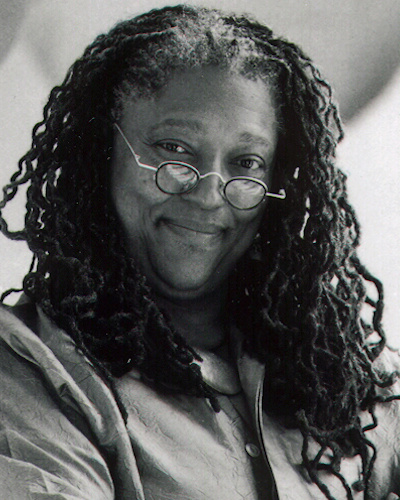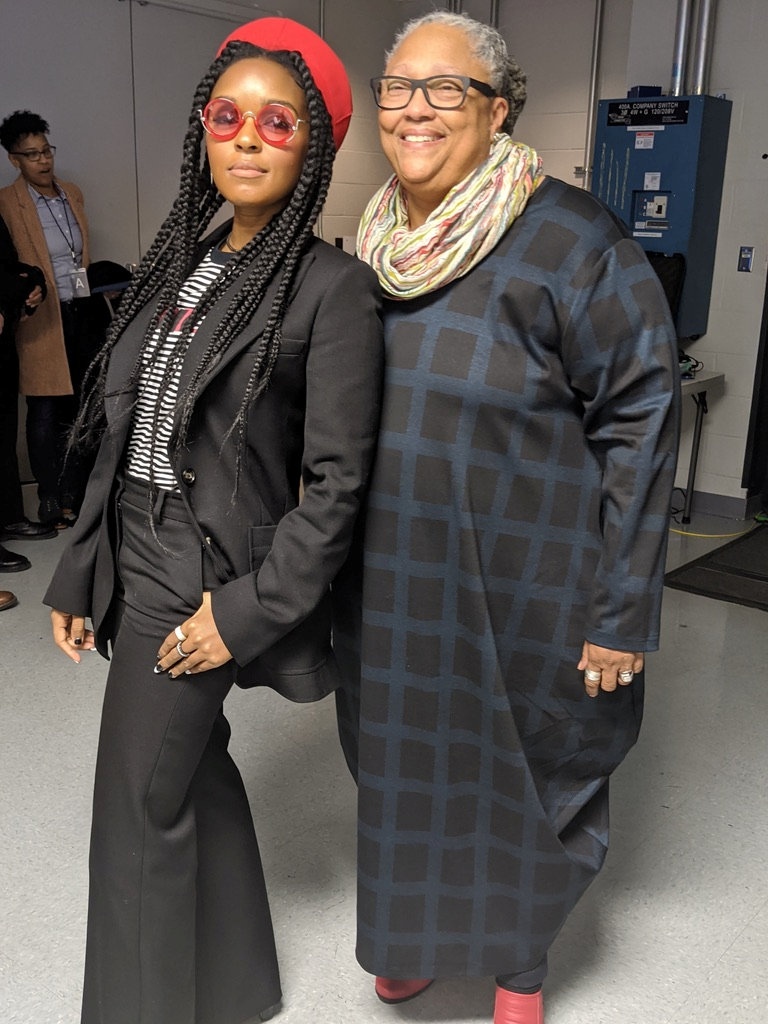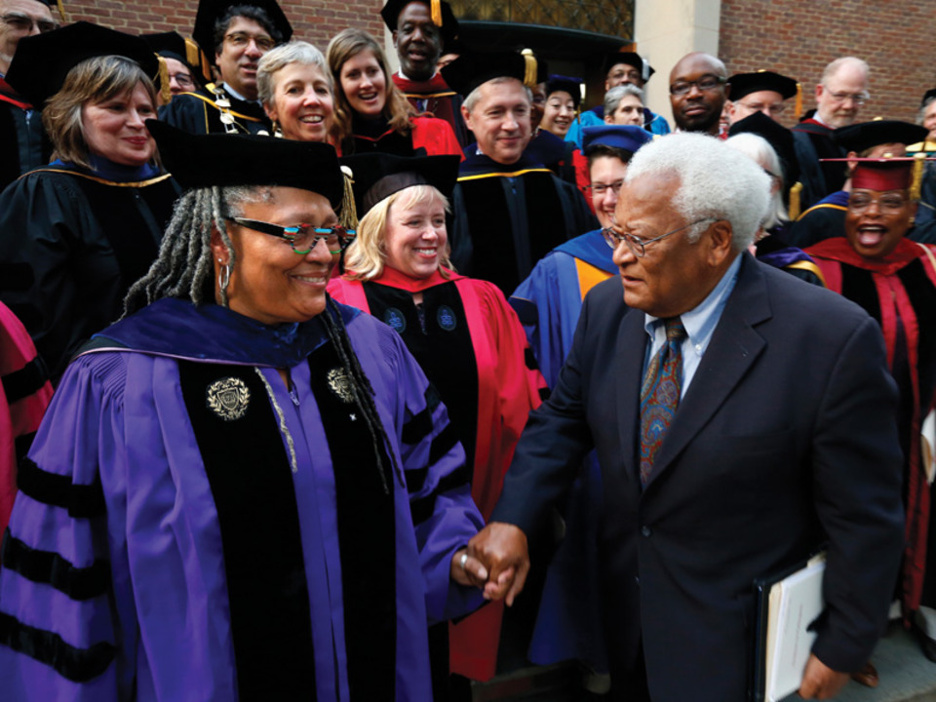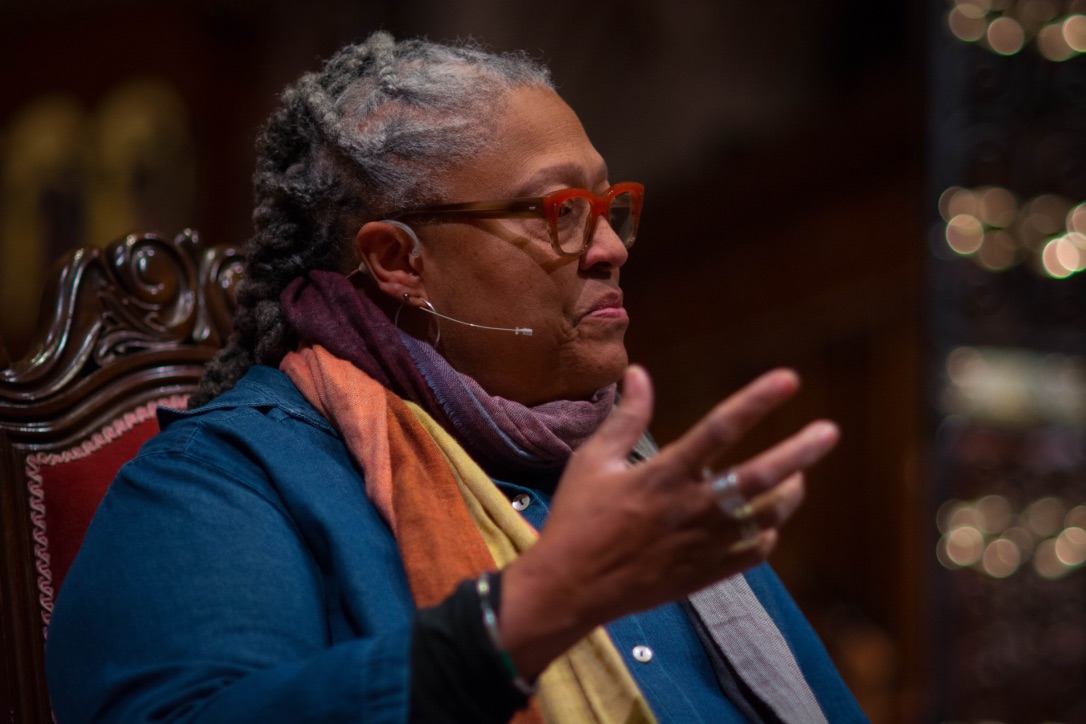
Rev. Dr. Emilie M. Townes
Biography
The Rev. Dr. Emilie M. Townes is an American Baptist minister and womanist ethicist. Townes grew up in the late 1950s in Durham, North Carolina, in a largely Black “trans-class” community comprised of people from across the socio-economic hierarchy of class. She grew up within five blocks of North Carolina Central University, where both her parents taught as professors. In her childhood the Black community in Durham was self-contained. North Carolina Central University imbued her with feelings of grandeur and her community prided itself on self-sufficiency. This insulated community was shattered with the advent of urban renewal when the construction of an interstate highway dissipated the community there. Growing up in the midst of desegregation, Emilie’s parents were homebodies who largely kept to themselves. Emilie and her younger sister played with the children in the neighborhood. Vacations consisted of visits to relatives’ homes and the occasional visit to a restaurant for dinner left her father unnerved and uneasy.
 With Janelle Monáe at the 2020 MLK, Jr. keynote conversation at Vanderbilt University
With Janelle Monáe at the 2020 MLK, Jr. keynote conversation at Vanderbilt University
Her parents were particularly progressive when it came to religion. For them the values and morals you instill in your children were more important than outward denominationalism. They had agreed to send their children to the church with the best Sunday school, regardless of denomination. That being said, her father was a devout man. Her mother used to call him “Mr. Methodism” because of his commitment to the church. Emilie remembers fondly her father arriving at the church early to turn the heat on to make sure it was warm. Her mother used Sundays to stay home and clean, often listening to the Duke University Chapel services on the radio. Her most vivid memory of church growing up was Rev. Doug Moore. For Emilie, he connected spirituality with the pursuit of social justice in the midst of the Civil Rights Movement in Durham. She became disenfranchised with organized religion after various pastors seemed to disconnect justice and spirituality in a way that didn’t seem congruent to Emilie. In reaction, she began going to Duke Forest to talk to God in nature and reflect. She often felt that God was her only constant in a world of turmoil and upheaval. In college at the University of Chicago, sports became an outlet for Emilie. It was also in college that she rediscovered her faith. She had a few friends who worked with the local Methodist church’s youth and there she decided to be re-baptized. Her interest in religion grew and she decided to pursue a major in Religious Studies. After earning her bachelor’s degree from the University of Chicago she stayed on to get her master's degree from its Divinity School, eventually completing a D.Min. degree in 1982.
It was during seminary that she felt she discerned a calling on her life for ministry. She was placed at Hyde Park Union Church for field education—and it was there among American Baptists that she felt like she had come home. Initially it had been her intention to pursue a career as a social worker, but realized that she had already been involved in ministry at Hyde Park Union Church and felt at home there. Although still not drawn to full-time ministry in a pulpit, Rev. Townes says, “I wear my ordination loosely” to describe her affinity for unconventional ministry. She found freedom in the spontaneity of Baptist worship and much preferred it to the liturgical Methodism of her youth. Later she would find a gift for teaching which propelled her career in yet another unexpected direction. She pursued a doctorate in philosophy in a joint program with Garrett-Evangelical Theological Seminary and Northwestern University, completing it in 1989. It was in a seminary class there, entitled “The Black Church and Feminism,” that Rev. Townes got her feet wet with teaching. This propelled her into a new profession within the academy. Her identity as a Black lesbian drove her forward in working towards social justice. She saw her scholarship as a form of activism by providing representation in the world of academia. She hopes for her work to live on in her students, as they go on to change the academy and the larger world.
 Shaking hands with the Reverend James Lawson at installation as dean of Vanderbilt Divinity School, August 2013
Shaking hands with the Reverend James Lawson at installation as dean of Vanderbilt Divinity School, August 2013
Dr. Townes has edited two books, A Troubling in My Soul: Womanist Perspectives on Evil and Suffering (Orbis,1993) and Embracing the Spirit: Womanist Perspectives on Hope, Salvation, and Transformation (Orbis, 1997). She has co-edited two books: Religion, Health, and Healing in African American Life, with Stephanie Y. Mitchem (Praeger, 2008) and Womanist Theological Ethics: A Reader, with Katie Geneva Cannon and Angela D. Sims (Westminster John Knox, 2011). She has also written four books: Womanist Justice, Womanist Hope (Oxford, 1993)—a study of the social and moral perspectives of the late nineteenth and early twentieth century Black woman activist Ida B. Wells Barnett; In a Blaze of Glory: Womanist Spirituality as Social Witness (Abingdon, 1995); Breaking the Fine Rain of Death: African American Health Issues and a Womanist Ethic of Care (Crossroad, 1998); and Womanist Ethics and the Cultural Production of Evil (Palgrave Macmillan, 2006). She is on the editorial board of Theology and Sexuality, the Journal of Religious Ethics, the Journal of Feminist Studies in Religion, Second Opinion, and the Encyclopedia of Women and Religion.
 Speaking at the Mile High Theology podcast hosted by the Reverend Broderick Greer at Saint John’s Cathedral, Denver, CO, November 2018
Speaking at the Mile High Theology podcast hosted by the Reverend Broderick Greer at Saint John’s Cathedral, Denver, CO, November 2018
Townes is currently the dean and the E. Rhodes and Leona B. Carpenter Professor of Womanist Ethics and Society of Vanderbilt University Divinity School. She is the former Andrew W. Mellon Professor of African American Religion and Theology at Yale University Divinity School where she was the fourth Black woman to be tenured in the university’s history. She is the former Carolyn Williams Beaird Professor of Christian Ethics at Union Theological Seminary in New York, and Professor of Christian Social Ethics and Black Church Ministries at Saint Paul School of Theology in Kansas City, Missouri. In 2005, she was elected vice-president of the American Academy of Religion (AAR). In 2008, she was the first African American woman to serve as president of AAR, which is the largest professional society for scholars of religion with over 10,000 members. She is a member of the Society of Christian Ethics and the Society for the Study of Black Religion. She was president of the latter from 2013 to 2016. In 2009, she was named a fellow of the American Academy of Arts and Sciences. Among her other organizations affiliations are the International Association for the Study of Religion and Gender (IRAG) and the American Association of Blacks in Higher Education.
(This biographical statement drafted by Cody Scercy and edited by Emilie Townes.)
Biography Date: June 2006; rev. December 2020
Additional Resources
Oral Histories:
Tags
Baptist (American Baptist/USA) | Black | Author/editor | Clergy Activist | Theology | Women and Religion | Townes, Emilie M.
Citation
“Rev. Dr. Emilie M. Townes | Profile”, LGBTQ Religious Archives Network, accessed February 28, 2026, https://lgbtqreligiousarchives.org/profiles/emilie-m-townes.
Remembrances